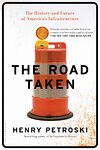

Fai clic su di un'immagine per andare a Google Ricerca Libri.
|
Sto caricando le informazioni... The Road Taken: The History and Future of America's Infrastructuredi Henry Petroski
 Nessuno Sto caricando le informazioni...
Iscriviti per consentire a LibraryThing di scoprire se ti piacerà questo libro. Attualmente non vi sono conversazioni su questo libro.   ) )I've enjoyed other Petroski books I've read, but this one felt more like a collection of material recycled from newspaper columns than a coherent book project, despite the care Petroski takes to tie everything in with Robert Frost's famous poem about decision-making processes in highway engineering. About a third of the book is the sort of thing Petroski does best, digging into the technological and design history of everyday items — why do we have kerbstones (or curbstones, if you prefer...)? Why are "stop" signs red? Who decided that traffic lights should have the red lamp at the top? Why do American roads have a white line on the nearside and a yellow line in the middle? That's engaging, good fun, and full of interesting anecdotes. But, after that, Petroski goes on to dig more deeply into the puzzle of why the USA, despite being one of the richest and most technologically-advanced countries in the world, is notorious for its crumbling and inadequate transportation infrastructure. And here he flounders rather. He's an engineer, not a politician or an economist, and his professional courtesy holds him back from stepping too directly into other people's fields of expertise, so all he can do is present us with case studies (mostly from his own special area, bridge-building) and show us the results of poor political decision-making, without ever venturing an opinion on the underlying causes or how they could be corrected. Reading between the lines we can see the processes generally identified (by Americans) as failures in the US political system operating: conflicts of interest and ideology between Federal and State or local authorities; the short-term thinking built into the election-cycle and the alternation of Democrat and Republican power; the voters' insistence on getting expensive public services whilst refusing to allow the government to pay for these through borrowing or taxation; the prioritisation of glamorous new projects over dull maintenance work; the difficulty of coming up with fair evaluations of economic benefit versus environmental cost; the delusion that public-private partnerships will magically generate free beer for voters, and so on. Petroski doesn't come up with any suggestions about how these, rather fundamental, issues could be overcome. Nor does he address what outsiders might argue is the really interesting question: how is it that the USA in the 20th and 21st century has always been such a rich, successful and powerful country, despite the crumbling state of its roads, bridges, ports and everything else? Could it be that it is actually a good strategy in the modern world to spend public money exclusively on prisons and the military...? I want a book about American infrastructure to be compelling. Sadly, this one isn’t it; it’s pretty much a straight-up account of how we’ve built bridges, roads, tunnels, etc. over the past century, and how we mostly stopped funding their maintenance, which is a very bad thing. Petroski isn’t a fan of privatization, but public-private partnerships—where the government sets the rules but gives the contractor flexibility in achieving the key goals—come off a bit better. nessuna recensione | aggiungi una recensione
"Physical infrastructure in the United States is crumbling. The American Society of Civil Engineers has, in its latest report, given American roads and bridges a grade of D and C+, respectively, and has described roughly sixty-five thousand bridges in the United States as 'structurally deficient.' This crisis--and one need look no further than the I-35W bridge collapse in Minnesota to see that it is indeed a crisis--shows little sign of abating short of a massive change in attitude amongst politicians and the American public. In The Road Taken, acclaimed historian Henry Petroski explores our core infrastructure from historical and contemporary perspectives and explains how essential their maintenance is to America's economic health. Recounting the long history behind America's highway system, Petroski reveals the genesis of our interstate numbering system (even roads go east-west, odd go north-south), the inspiration behind the center line that has divided roads for decades, and the creation of such taken-for-granted objects as guardrails, stop signs, and traffic lights--all crucial parts of our national and local infrastructure. His history of the rebuilding of the San Francisco-Oakland Bay Bridge reveals the complex and challenging interplay between government and industry inherent in the conception, funding, design, and building of major infrastructure projects, while his forensic analysis of the street he lives on--its potholes, gutters, and curbs--will engage homeowners everywhere. A compelling work of history, The Road Taken is also an urgent clarion call aimed at American citizens, politicians, and anyone with a vested interest in our economic well-being. The road we take in the next decade toward rebuilding our aging infrastructure will in large part determine our future national prosperity"-- Non sono state trovate descrizioni di biblioteche |
Discussioni correntiNessunoCopertine popolari
 Google Books — Sto caricando le informazioni... Google Books — Sto caricando le informazioni...GeneriSistema Decimale Melvil (DDC)388.10973Social sciences Commerce, Communications, Transportation Transportation RoadsClassificazione LCVotoMedia: (3.29) (3.29)
Sei tu?Diventa un autore di LibraryThing. |
||||||||||||||||||||||||||||||||||||||||||||||||||||||||||||||||||||||||||||||||||||||||||||||||||||||||||||||||||||||||